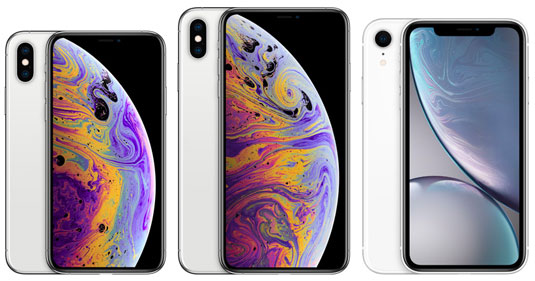Hosted by site sponsor WebMate.
iPhone Q&A
Published October 26, 2018
All Apple Q&As >> iPhone Q&A (Home)
To be notified of new Q&As, sign up for EveryMac.com's bimonthly email list.
How fast are the iPhone XS, iPhone XS Max, and iPhone XR models compared to one another? How fast are they compared to earlier models?
Please note that the iPhone XS, iPhone XS Max, and iPhone XR models all have been discontinued. However, this Q&A is up-to-date and remains quite useful for anyone considering one of these models on the used market.
In a pair of matching press releases for the iPhone XS/iPhone XS Max and the iPhone XR, Apple notes that all three of these models have a new Apple-designed A12 "Bionic" processor.

Photo Credit: Apple, Inc. (iPhone XS, iPhone XS Max & iPhone XR)
With identical copy in both press releases, Apple more specifically boasts:
A12 Bionic features a six-core fusion architecture with two performance cores that are up to 15 percent faster, four efficiency cores that are up to 50 percent more efficient, a four-core GPU that is up to 50 percent faster, powerful Apple-designed Image Signal Processor (ISP), video encoder and more.
A 15% speed boost compared to a previous model always is welcomed, but the simple fact that Apple uses the same information for both press releases should be a solid hint that the iPhone XS, iPhone XS Max, and iPhone XR offer the same performance.
The independent Geekbench benchmark does note that the higher-end iPhone XS/iPhone XS Max models have 4 GB of RAM whereas the more-or-less mass market iPhone XR only has 3 GB of RAM. They otherwise are identical in terms of components that influence performance.
Consequently, it is a safe assumption that these three devices are essentially the same speed. Nevertheless, third-party benchmarks can be helpful for confirmation. Benchmarks also can be helpful to verify Apple's official 15% claim and determine how much faster these models are than earlier ones because most users do not upgrade to a new iPhone every year.
Benchmark Performance Overview
For a solid general overview of the performance differences between the iPhone XS, iPhone XS Max, and iPhone XR and earlier iPhone models as well as the iPad and iPod touch, Everyi.com's own Ultimate iComparison makes it quick to compare side-by-side Geekbench benchmark averages for hundreds of possible performance comparisons.
The Geekbench 4.0 benchmark confirms that the performance of the iPhone XS, iPhone XS Max, and iPhone XR models falls within the margin of error. There definitely is not a perceptible difference in day-to-day operation.
Compared to other recent iPhone devices, the iPhone XS, iPhone XS Max, and iPhone XR are modestly faster than their immediate predecessors and more significantly faster than earlier models:
| iPhone XS/XS Max/XR Compared To: | Percent Faster (Single Core) |
Percent Faster (Multicore) |
| iPhone X/iPhone 8 | 14% | 11% |
| iPhone 7 | 39% | 94% |
| iPhone 6s | 101% | 175% |
| iPhone SE | 94% | 164% |
| iPad (6th Gen) | 39% | 90% |
| iPad Pro 10.5" | 24% | 90% |
| MacBook (Core m3, Mid-2017) | 35% | 65% |
With an evaluation of the above, you clearly can see that the Geekbench 4 benchmark shows a small increase in performance compared to the iPhone X and iPhone 8, with more significant performance gains when compared to models that are a bit older.
Performance Summary
Ultimately, the iPhone XS, iPhone XS Max, and iPhone XR are the same speed and provide a modest performance jump compared to their predecessors. Apple's claim of a 15% performance boost over the iPhone 8, iPhone 8 Plus, and iPhone X is reasonable.
Also see: What are the major differences between the iPhone XS, iPhone XS Max, and iPhone XR? Which is best for me?
Permalink | Report an Error/Typo | Sign Up for Site Update Notices
<< iPhone Q&A (Main) | All Apple Q&As
Established in 1996, EveryMac.com has been created by experts with decades of experience with Apple hardware. EveryMac.com includes, and always has included, original research incorporating detailed, hands-on inspection of packaging, computers, and devices as well as extensive real-world use. All information is provided in good faith, but no website or person is perfect. Accordingly, EveryMac.com is provided "as is" without warranty of any kind whatsoever. EveryMac.com, and the authors thereof, shall not be held responsible or liable, under any circumstances, for any damages resulting from the use or inability to use the information within. For complete disclaimer and copyright information please read and understand the Terms of Use and the Privacy Policy before using EveryMac.com. Copying, scraping, or use of any content without expressed permission is not allowed, although links to any page are welcomed and appreciated.
